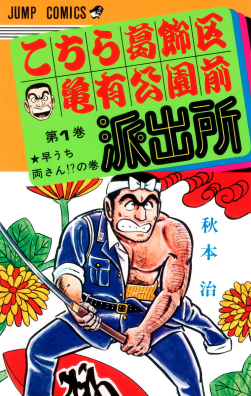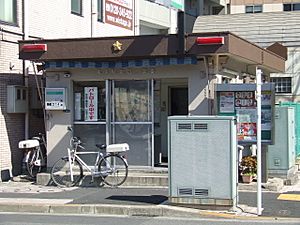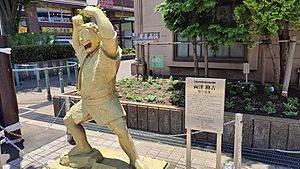KochiKame: Tokyo Beat Cops facts for kids
| KochiKame: Tokyo Beat Cops | |

First tankōbon volume cover, featuring Kankichi Ryotsu
|
|
Quick facts for kids こちら葛飾区亀有公園前派出所 |
|
|---|---|
| Genre | Comedy |
| Manga | |
| Written by | Osamu Akimoto |
| Published by | Shueisha |
| Demographic | Shōnen |
| Imprint | Jump Comics |
| Magazine | Weekly Shōnen Jump |
| Original run | September 21, 1976 – September 17, 2016 |
| Volumes | 201 |
| Anime film | |
| Directed by | Hiroshi Sasagawa |
| Written by | Takao Koyama |
| Music by | Tadayoshi Matsui |
| Studio | Tatsunoko Productions |
| Released | November 23, 1985 |
| Runtime | 30 minutes |
| Anime television series | |
| Directed by |
|
| Music by |
|
| Studio | Studio Gallop |
| Network | Fuji TV |
| Original run | Regular broadcast June 16, 1996 – December 19, 2004 Irregular broadcast January 3, 2005 – September 18, 2016 |
| Episodes | 373 + 27 specials |
| Anime film | |
| Kochira Katsushika-ku Kameari Kōen-mae Hashutsujo the Movie | |
| Directed by | Shinji Takamatsu |
| Written by | Toshimichi Okawa |
| Studio | Studio Gallop |
| Released | December 23, 1999 |
| Runtime | 95 minutes |
| Anime film | |
| Kochira Katsushika-ku Kameari Kōen-mae Hashutsujo the Movie 2: UFO Shūrai! Tornado Daisakusen!! | |
| Directed by | Shinji Takamatsu |
| Written by |
|
| Studio | Studio Gallop |
| Released | December 20, 2003 |
| Runtime | 109 minutes |
Kochira Katsushika-ku Kameari Kōen Mae Hashutsujo (こちら葛飾区亀有公園前派出所, lit. "This Is a Police Box (kōban) in Front of Kameari Park in Katsushika Ward"), often shortened to KochiKame (こち亀), is a very popular Japanese comedy series. It's about the funny adventures of a middle-aged police officer named Kankichi Ryotsu. The story takes place around a small police station in downtown Tokyo.
This series was published in Weekly Shōnen Jump for an amazing 40 years. It ran from September 1976 to September 2016. It has 1,960 chapters collected into 201 tankōbon volumes. This makes it one of the manga series with the most volumes ever!
KochiKame has been made into many different things. There's an anime TV show, three animated movies, and two live-action movies. It also has stage plays and a live-action TV series. A short anime was even made to help people learn about goalball, a sport played in the Paralympic Games.
By 2016, over 156.5 million copies of the manga were in circulation. This makes it one of the best-selling manga series in history. KochiKame has also won important awards. These include the Special Judges Award at the 50th Shogakukan Manga Award in 2005. It also won the 48th Seiun Award for Best Comic in 2017.
Contents
The Story of KochiKame
The main character in KochiKame is Kankichi "Ryo-san" Ryotsu. He often comes up with funny ideas to make money. He might invent a new gadget or try to make money from a popular trend. Things usually go well at first, but then they get out of control. In the end, Ryo-san usually loses all his money.
The humor in the series comes from mixing everyday people with very unusual characters. For example, there's Keiichi Nakagawa, who is very rich. Another character is Ai Asato. Even though they are police officers, they don't do much actual police work in the stories. The series focuses more on their funny adventures.
The story of KochiKame changed with the times. Most of the main characters don't really get older, even though the series lasted for decades. However, some characters do age, like the grandchild of Buchao. This character started as a baby and is now almost in junior high.
KochiKame is popular with many different age groups. Both kids and adults enjoy Ryo-san's silly actions. Kids can laugh at his funny mistakes. Adults might relate to the humor about getting older. The stories often gently make fun of the latest trends. The content is generally lighthearted and innocent.
The creator, Osamu Akimoto, made KochiKame as a tribute to the working-class people and areas of old Tokyo. Many chapters start with a detailed picture of a downtown street scene. These pictures often show old wooden buildings and kids playing outside.
KochiKame in Different Media
Manga Series
The KochiKame manga was written and drawn by Osamu Akimoto. It started in Shueisha's Weekly Shōnen Jump magazine on September 21, 1976. Akimoto first used the name "Tatsuhiko Yamadome" but changed to his real name in 1978.
The chapters were collected into tankōbon volumes by Shueisha. The first volume came out on July 9, 1977. The series officially ended on September 17, 2016. This was to celebrate KochiKame's 40th anniversary. The 200th tankōbon volume was released on the same day.
Akimoto later created a new chapter of Kochikame in September 2017. A 201st volume was released in October 2021. A new one-shot chapter was also planned for July 2023.
From 2017 to 2019, Akimoto also created a sequel series called Ii Yu da ne!. This story is set in a public bathhouse next to a police station in Tokyo.
Anime Adaptations
Even though the manga started in 1976, KochiKame wasn't made into an anime right away. It was thought that a live-action version might be a better fit. However, it did appear in commercials for toys and snacks as early as 1980.
A 30-minute animated film was made by Tatsunoko Production in 1985. It was shown at a Shonen Jump Anime Festival. This film was later given out as a prize for a contest.
The KochiKame anime TV show finally started airing on Fuji Television on June 16, 1996. It was made by Studio Gallop. The show ran for eight years and had 382 episodes. It ended on December 19, 2004.
Two animated movies were also made for cinemas. The first movie, Kochira Katsushika-ku Kameari Kōen-mae Hashutsujo the Movie, came out on December 23, 1999. The second movie, Kochira Katsushika-ku Kameari Kōen-mae Hashutsujo the Movie 2: UFO Shūrai! Tornado Daisakusen!!, was released on December 20, 2003.
On September 18, 2016, a special hour-long episode aired on Fuji TV. This was for the manga's 40th anniversary. It was called Kochira Katsushika-ku Kameari Kōen-mae Hashutsujo The Final: Kankichi Ryotsu's Last Day.
In 2006, a Hindi version of KochiKame started airing in India on Hungama TV. It later moved to Disney XD India.
Live-Action Versions
KochiKame has also been adapted into live-action films and TV shows. The first live-action movie came out in 1977. A live-action TV series started airing in Japan on August 1, 2009. A second live-action movie, based on this TV series, was released in 2011.
There have also been stage plays based on KochiKame. A new play opened in September 2016 to celebrate the series' 40th anniversary.
Other Fun Media
To celebrate its 40th anniversary, KochiKame was part of a special novel series. This series featured characters from KochiKame crossing over with characters from other popular series.
Ryo-san, the main character, can be played in several Weekly Shōnen Jump fighting video games. These include Jump Super Stars, Jump Ultimate Stars, and J-Stars Victory VS. Other characters from the series also appear in these games. The release of J-Stars Victory VS.+ was the first time KochiKame material was officially available in English-speaking countries.
Many toys and collectibles have also been made. Some of these toys were first shown as inventions by Ryo-san in the manga itself!
KochiKame in Real Life
Kameari Koen is a real park located in Tokyo's Katsushika ward. The police station in the manga is fictional, but it looks like a real one near Kameari railway station. The manga has made this neighborhood very famous. Many people from all over Japan visit it. However, where the fictional police station is supposed to be, there's actually an empty lot.
In February 2006, two life-size bronze statues of Ryo-san were put up. You can find them at the north and south entrances of Kameari Station. There are now 14 statues of characters from the series in the area.
30th Anniversary Celebrations
To celebrate the 30th anniversary of Kochira Katsushika-ku Kameari Kōen Mae Hashutsujo, several special events were held. Special one-shot chapters of the series were published in thirteen different Shueisha magazines. These were released between August and October 2006.
See also
 In Spanish: KochiKame para niños
In Spanish: KochiKame para niños
- Kōban, which are neighborhood police stations in Japan
 | Calvin Brent |
 | Walter T. Bailey |
 | Martha Cassell Thompson |
 | Alberta Jeannette Cassell |



